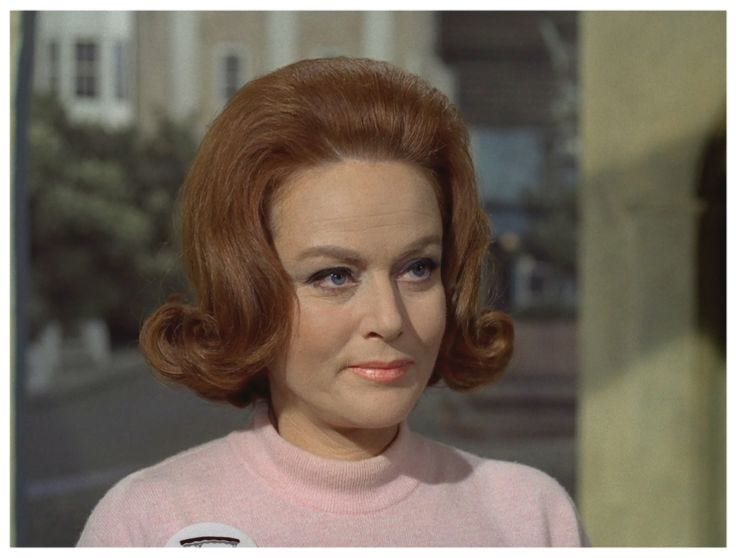This entry expanded so it covers Act 3 only. Act 4 has lots of juicy geography, so will keep for next time. And - fingers crossed - I’ll put up my look at the Blake’s 7 episode ‘Orac’ in a couple of days.
Another note - I’m indebted to punter Frank Shailes, who has written in to tell me that Trevor Howard was apparently never cast as Number 2 in ‘Dance’. This seems to have been accepted into lore after a mixup by an extra at Portmeirion, who told an early researcher that he’d seen Howard and he’d been drinking - but had in fact mixed him up with Eric Portman. This is interesting, as it shows how things get garbled, become a good story, and enter the ‘historical’ record - not only in old TV shows, but actual history. And also because it reveals that making Number 2 a woman and casting Mary Morris were considered decisions, not last-minute brainwaves.
The Language Of Love
All five episodes so far have involved Village honey traps of a kind, as side dishes. But Operation Nadia is much the most blatant, the main course of the episode, and she is neither a brainwashed stalker or an intriguing ingenue but a ‘deep cover’ agent, who manages to convince P of her integrity. The script is slightly more romantic than the filmed end product, suggesting at moments that P himself might be feeling a very faint twang at his heartstrings. The script’s version of the moonlit ‘language of love’ scene on the patio, for example, suggests he might be actually falling for her (though the script also has him snapping ‘Just shut up’ at her flirting in the crate later on, changed on screen to the more paternal ‘Just go to sleep’).
We come up on Act 3 with Nadia - literally, as well as figuratively, the girl next door - arriving for breakfast at Number 6. This apparently charms Number 2, who sets off to pay the happy couple a call. In the script, a ‘devoted young couple’ pass by during this chat outside P’s cottage, with Number 2 pointing out that they ‘met here’. But as we have seen, romance and sex seem to be discouraged in the Village, so this would look very out of place. Its excision is a good example of how the finished version plays down the script’s idea of giving P somebody to love.
In the screened version, P is very much more in the chivalrous John Drake mode, motivated by ‘damsel in distress’ concerns (a trait that a later Number 2 will note). The romance is all thrown back on to Nadia. Her seemingly genuine yen for P in the crate scenes of Act 4 seems a bit of a cheat considering her true identity, but we must remember how real life sleeper agents have inveigled themselves into their targets’ love lives. The case of policeman Mark Kennedy, who entered into relationships with several women involved in environmental protest campaigns in the early Noughties, comes to mind. I imagine playing the part convincingly means playing it all the time, even when you’re stuck in a box with your mark, and they can’t see you.
The script is also a little more keen to quell any doubts we or P might have about Nadia. It features a scene of her being menaced by Rover in the woods after she neglects P’s advice to ‘keep to the paths’. I think this was a wise cut, as it might begin to look as if we’re being too reassured that she’s kosher. (Though putting this episode out second makes selling the idea to us that P has genuinely escaped to London already even more of an uphill task.)
Nadia has some interesting cut lines after this incident, however. Discussing her reasons for resigning, she tells P of her job; ‘Some of it, so horrible. I wasn’t going to betray my country - I just couldn’t stand the work any longer. They don’t believe me!’ This, we must remember, was P’s story in ‘Arrival’ - exactly. But if the Village was using that to elicit his sympathy for her, then it would mean they believe his story. And they can’t, or he wouldn’t be in the Village, and the series wouldn’t be happening. Which is probably why this dialogue was cut.
Still, the question the Village are always asking him should be, ‘Yes, but why did you resign really?’
Keep reading with a 7-day free trial
Subscribe to The Culture Bunker to keep reading this post and get 7 days of free access to the full post archives.




